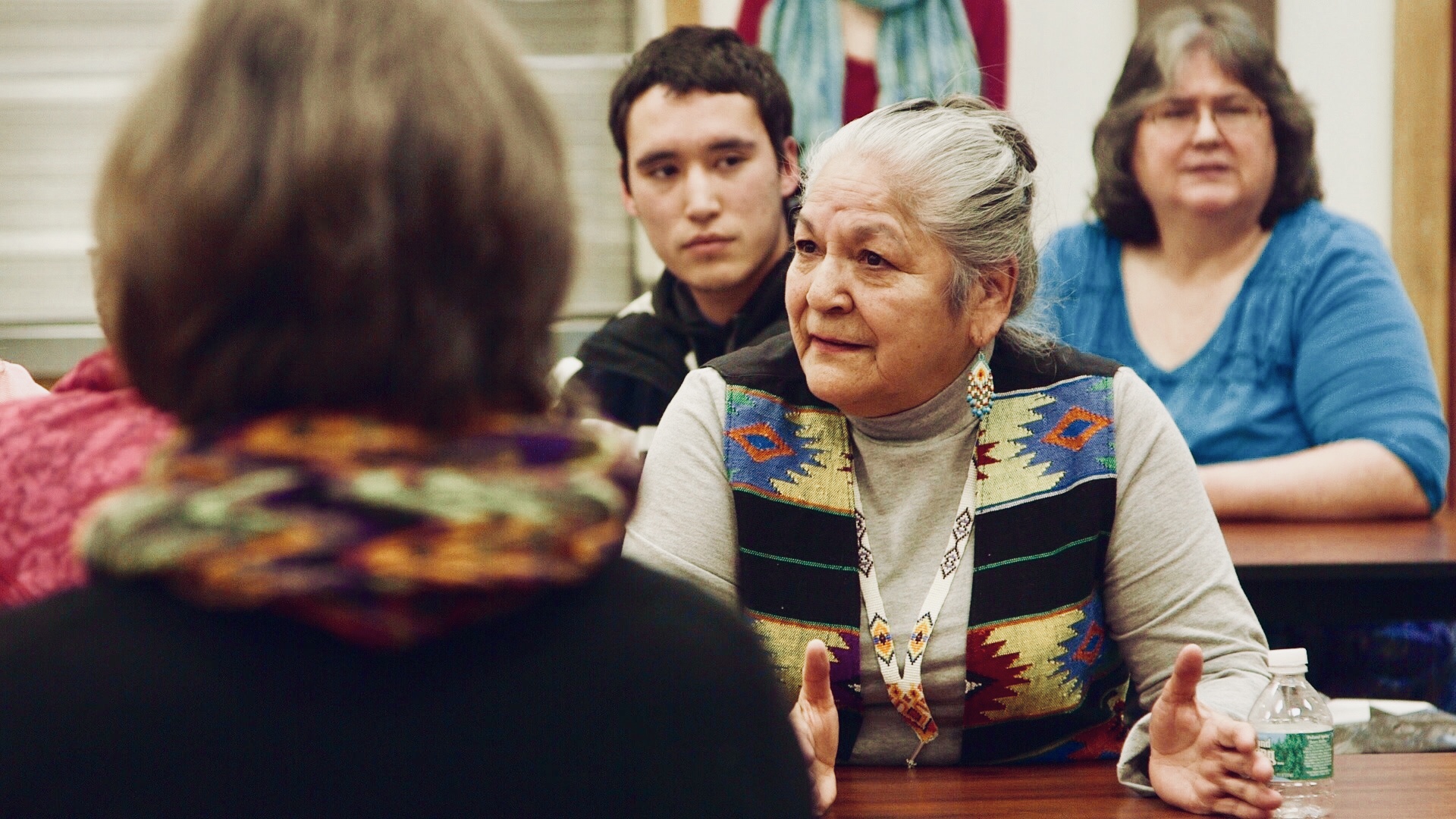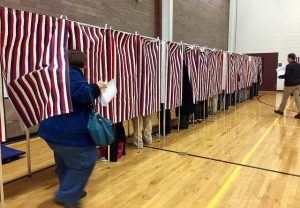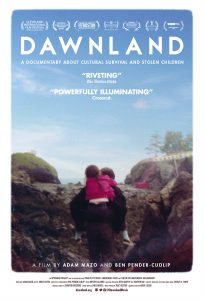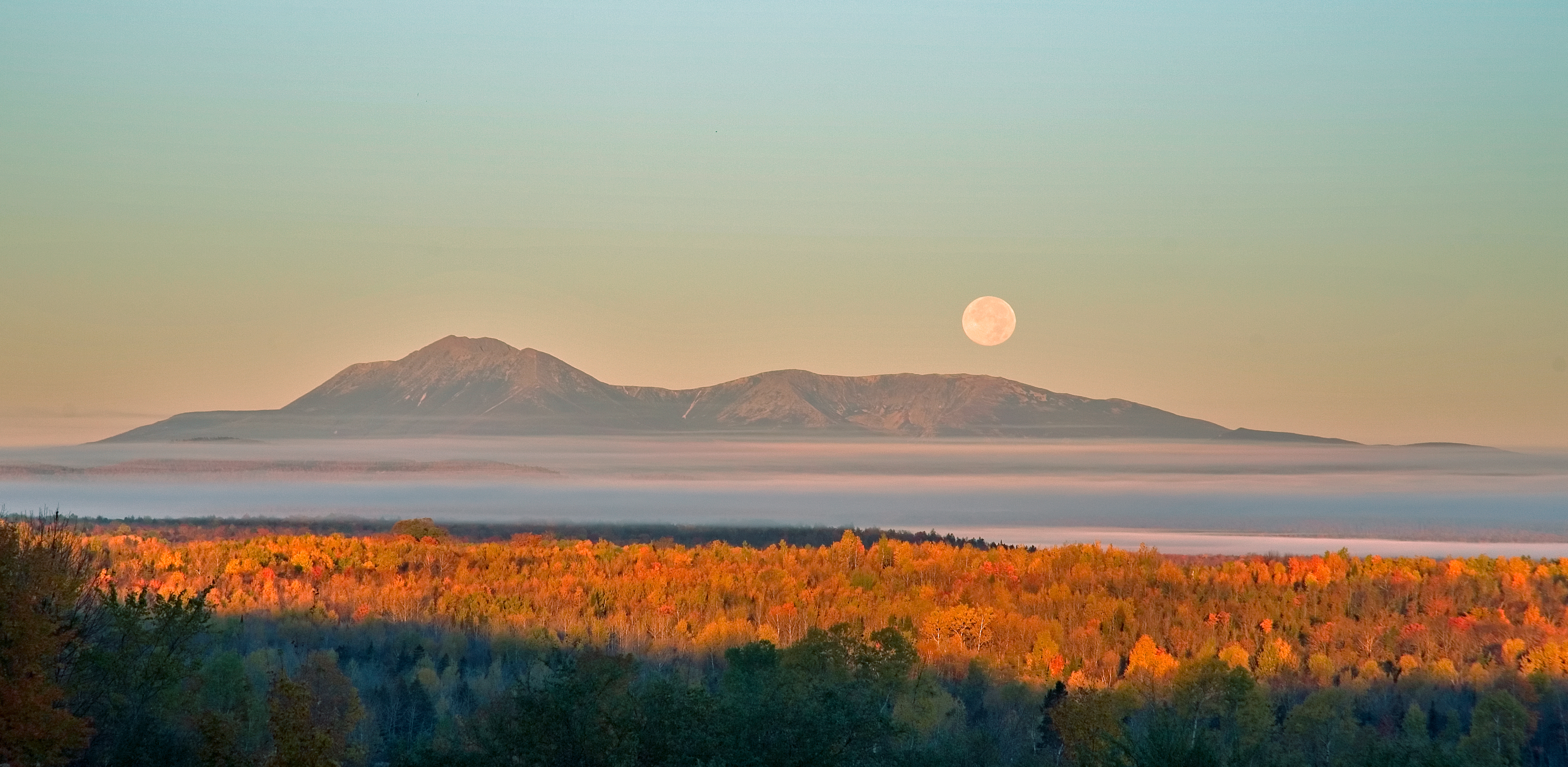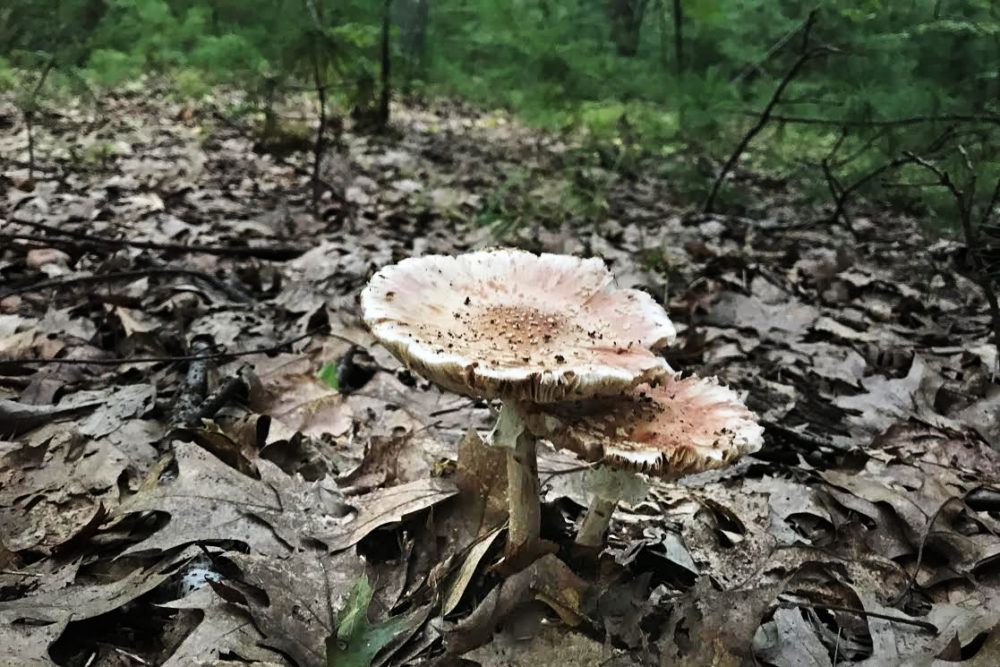Episode 117: “Dawnland” Explores Reconciliation With Native People; Younger Politicians Try To Break Into “Old” State Houses

As the election approaches, we explore what questions will be on ballots around the region. We hear from young candidates who are trying to make it into New Hampshire’s aging State House. Plus, we discuss a new documentary that tells the story of the Maine Wabanaki-State Child Welfare Truth and Reconciliation Commission, created to investigate the state’s history of separating Wabanaki children from their families. As the weather cools, we also go outside to hear about rising moose mortality rates, tips for safe hiking, and how mushrooms could help mitigate the effects of climate change.
It’s NEXT.
Ballot Questions Ask Voters to Weigh in on a Variety of Issues
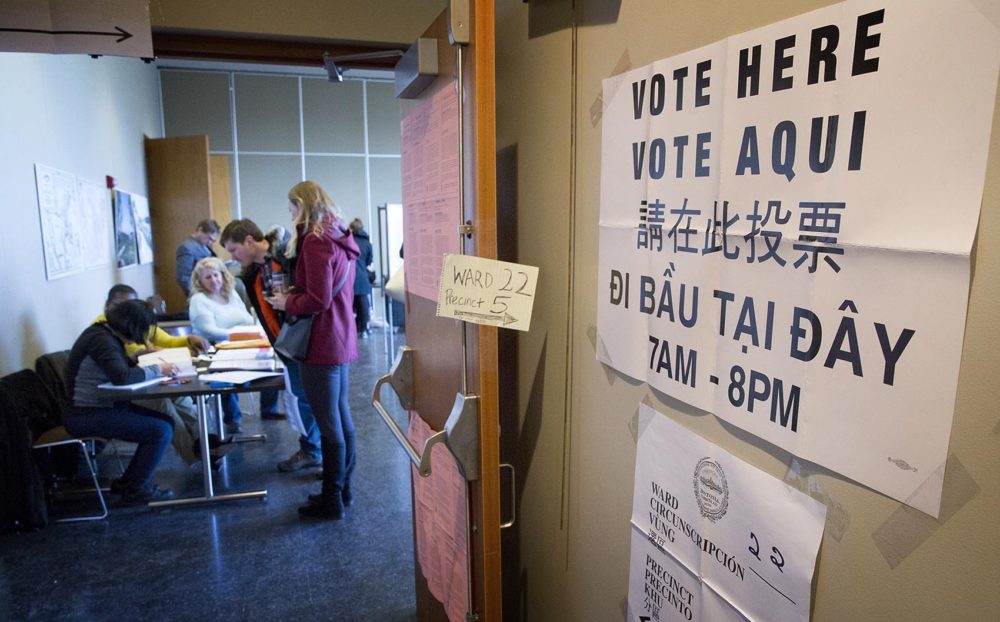
Voters check in at the polling station at the Honan-Allston Branch of the Boston Public Library. Photo by Robin Lubbock for WBUR
The November elections are coming up fast. In addition to candidates, there are a number of important ballot questions for voters in our region to consider. There’s nothing quite as exciting as legalized marijuana on the ballot, but several are just as contentious. Here is a breakdown of the ballot questions in each state.
Massachusetts
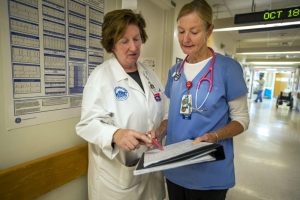
Theresa Capodilupo, a nurse director and Brenda Pignone, a bedside nurse, review the daily patient assignment sheet for White 7, a post-surgery and trauma unit at Massachusetts General Hospital. Photo by Jesse Costa for WBUR
In Massachusetts voters will give thumbs up or down to a proposal to limit how many patients can be assigned to each registered nurse in hospitals and certain other health care facilities in the state. WBUR’s Martha Bebinger spoke to nurses about how they feel about the question. If you really want to explore the debate around Massachusetts Ballot Question 1, check out a debate held by WBUR’s “Radio Boston.”
Question 2 will have Massachusetts voters weigh in on whether or not corporations should have the same constitutional rights as citizens. Specifically, if Question 2 passes, voters will have mandated the creation of a commission that would look at how to make the 2010 Supreme Court decision, Citizens United v. Federal Election Commission, nullified in the state. For a short explainer, listen to reporting from WBUR’s Quincy Walters. If you have more time to dive in, listen through to a debate held about the question by WBUR’s “Radio Boston.”
Question 3 asks voters to consider whether or not to repeal a state law banning discrimination against transgender people in places of accommodation. WBUR’s Steve Brown reported on the question and produced this video explanation.
You can read all three Massachusetts ballot questions here.
Maine
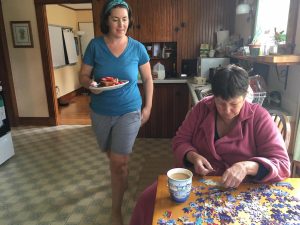
Jessica, 34, cares for her mom, Monica, who is 63 and has dementia. She told Maine Public’s Patty Wight about how Maine’s Question 1 would affect her mother’s care. Photo by Patty Wight for Maine Public
Ballot question 1 in Maine also deals with health care. It would create a Universal Home Health Care program to provide home-based assistance to people with disabilities and senior citizens, regardless of income. But who will pay for this home care program? It would be funded by a new 3.8 percent tax on individuals and families with wages above $128,400 in 2018. Maine Public Radio’s Patty Wight reported on the debate around this question. All four candidates for Governor do not support Question 1.
Maine voters will also vote on an additional four ballot questions in November, all of which have to do with bond issues. Question 2 asks voters to weigh in on a $30,000,000 wastewater bond. Question 3 deals with a $106,000,000 infrastructure bond. Question 4 asks about a $49,000,000 public university bond and Question 5 asks about a $15,000,000 community college bond. Read more about all five questions here.
You can read all five Maine ballot questions here.
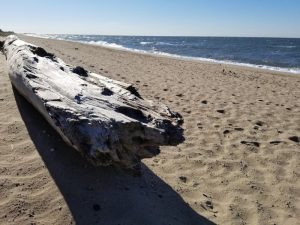
Hammonasset Beach in Madison is one of Connecticut’s most popular plots of public land. Photo by Patrick Skahill for Connecticut Public Radio
Connecticut
Question 2 in Connecticut has to do with changing the process which legislators have to go through if they want to sell public land. Connecticut Public Radio’s Patrick Skahill reported on why this issue is up for a vote.
The other question on the Connecticut ballot would create a lockbox to protect transportation funds. Connecticut Public Radio’s Frankie Graziano reported on what this question means.
You can find Connecticut Question 1 here, and Question 2 here.
Rhode Island
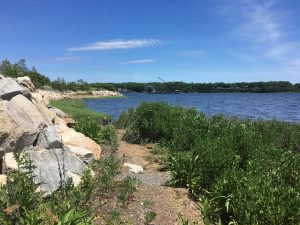
The Providence River. A proposed Green Economy and Clean Water Bond would help improve the quality of state waters. Photo by Avory Brookins for RIPR
In Rhode Island the questions kind of look like a menu with price tags for each item. These are bond issues that voters will vote up or down. The third question allocates $47.3 million for a wide variety of programs packaged as “Green Economy and Clean Water.” Alex Kuffner from The Providence Journal breaks down where this money would go.
The first question on the Rhode Island ballot would approve a $250,000,000 bond for school buildings in the state. The second question would approve $70,000,000 to be allocated between two higher education facilities.
You can find a sample ballot with Rhode Island ballot questions here.
New Hampshire
In New Hampshire, the two questions on the ballot are a bit more confusing. The first has to do with expanding the ability of taxpayers to sue the government if they believe funds are being misused.
The second question has to do with an individual’s right to privacy. Anna Brown, Director of Research and Analysis of Citizens Count, described both questions on NHPR’s “The Exchange” on Wednesday. The ballot measures in New Hampshire need a two-thirds majority in order to pass.
You can read New Hampshire’s ballot questions here.
Vermont
Vermont voters will only be voting for candidates, not ballot questions on November 6.
Young Candidates Work Towards New Hampshire State House
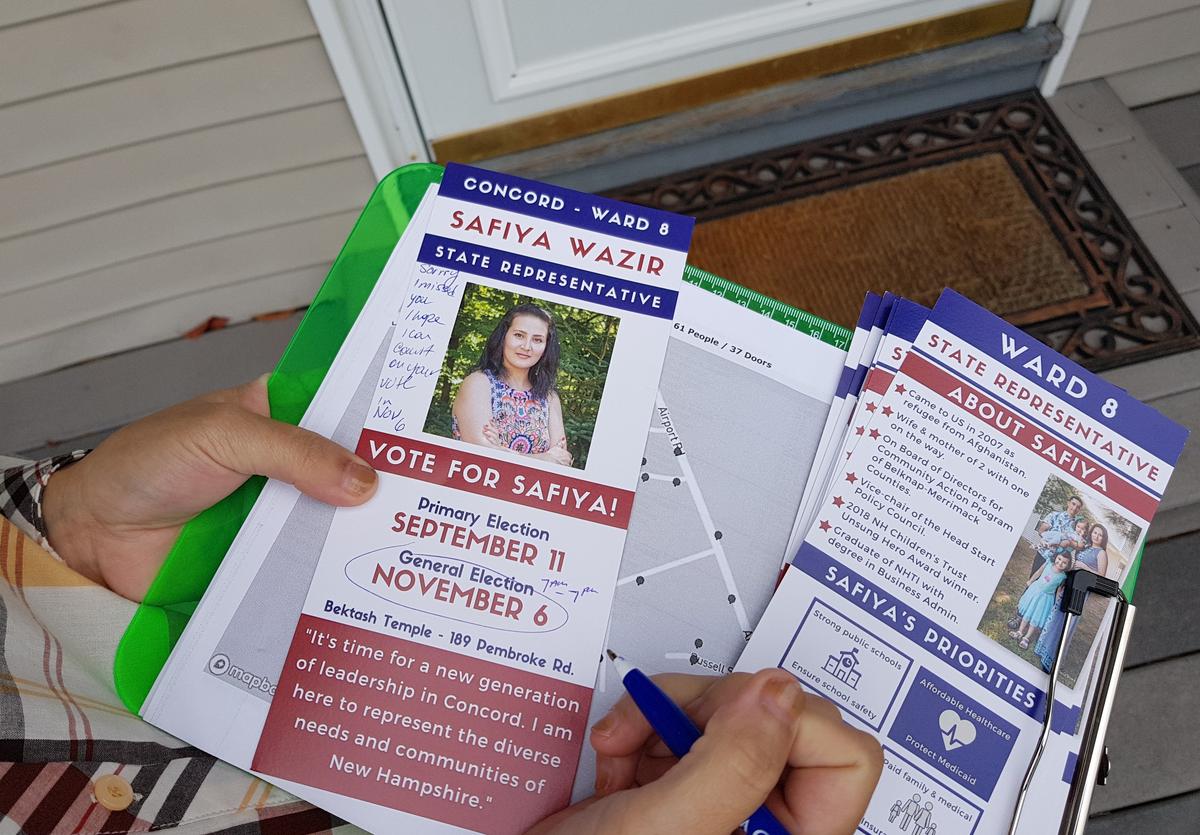
When no one answers the door while she’s canvassing, Safiya Wazir leaves this flier and note that says, “I’m sorry I missed you. I hope I can count on your vote on Nov. 6th.” Photo by Daniela Allee for NHPR
New Hampshire has one of the oldest state legislatures in the country. Not old as in founded in 1784. But old as in the vast majority of people making the state’s laws are older. In 2015 the average age of State Senators and Representatives was 66. NHPR’s Daniela Allee reports that both Democrats and Republicans are trying to change that.
Documentary Explores Reconciliation with Native People
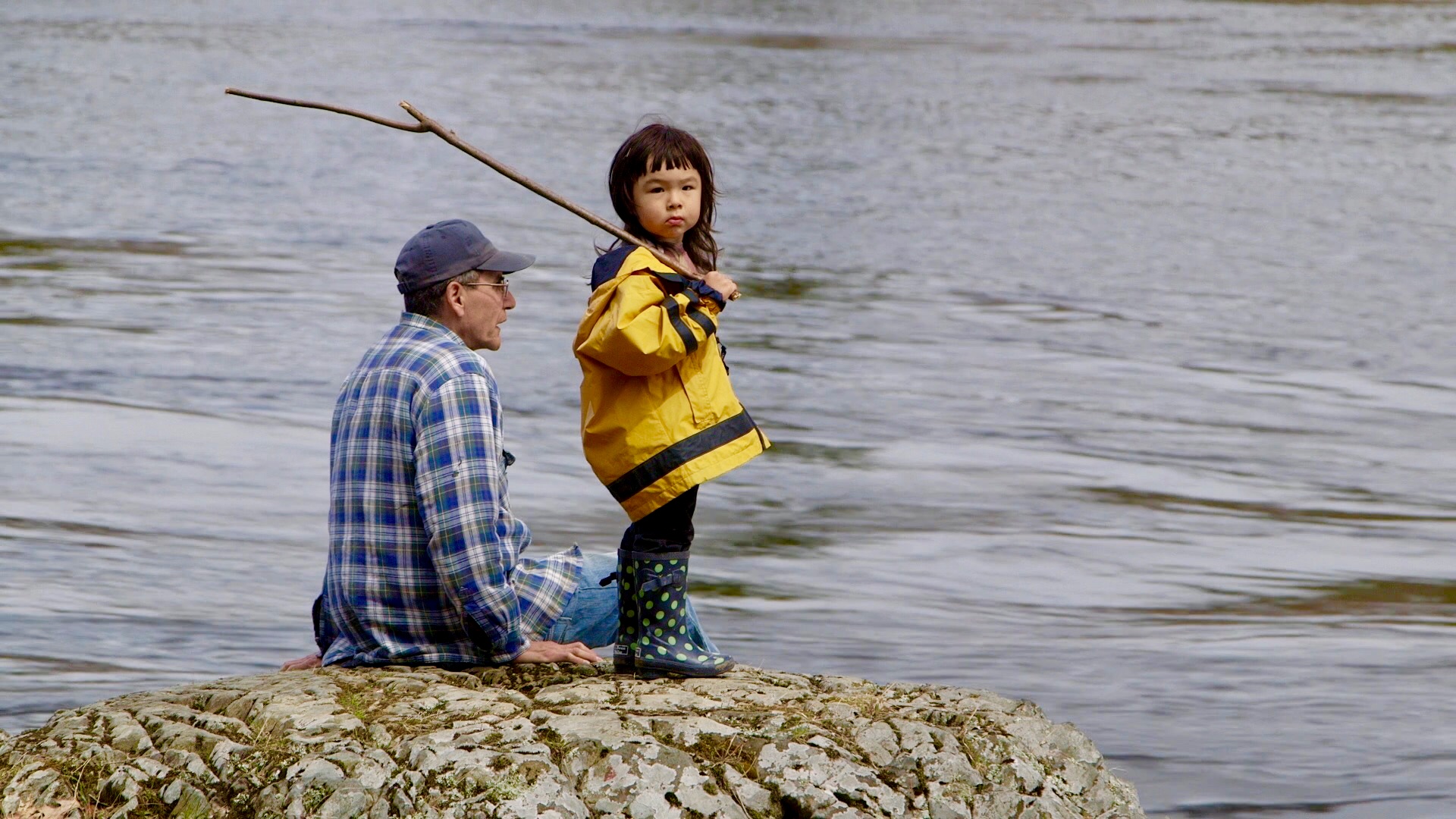
Father and child, Indian Island, Maine. Photo by Ben Pender-Cudlip, courtesy of the Upstander Project
The history of colonial Americans systematically taking land and disenfranchising native people is well-documented. But that’s how it’s treated, as history. But throughout the 20th century, and into this century, state and federal governments have systematically removed Native American children from their homes, placing them in boarding schools or in the homes of white families.
In the 1970s, one in four native children around the country were removed from their families, but as recently as 2002 to 2015, Wabanaki children in Maine entered foster care on average at 5.1 times the rate of non-Native Children. These practices have left lasting impacts on families and native communities around the United States.
A new documentary, Dawnland, explores this practice in the state of Maine, and a Truth and Reconciliation Commission that was held to investigate the removal of native children from their homes. The Maine Wabanaki-State Child Welfare Truth and Reconciliation Commission spent two years speaking with people from the Wabanaki confederation – a group of five tribal nations – about the impact of these practices.
We speak with Esther Anne and Maria Girouard about the TRC. Esther Anne is a child welfare expert and the co-director of Maine-Wabanki Reach. She helped to establish the Truth and Reconciliation Commission. Maria Girouard is a member of the Penobscot Nation, Health and Wellness Coordinator for Maine-Wabanaki Reach and a founder of Dawnland Environmental Defense.
You can watch Dawnland on PBS’ Independent Lens on Monday, November 5 at 10 PM.
You can also see the documentary at screenings around the region:
- October 29 at 6:30 PM at the University of Maine, Orono
- November 1 at 7 PM at the Paramount Center in Boston
- November 1 at 7:15 PM in Waterville, Maine
- November 3 at 1 PM at the Star Theater in Kittery, Maine
- November 7 at 6 PM at Bates College in Lewiston, Maine
- November 9 at 7 PM at Bard College at Simon’s Rock in Great Barrington, Massachusetts
- November 15 at 6:30 PM in Watertown, Massachusetts
- November 15 at 7 PM in Brunswick, Maine
- November 16 at 5:30 PM at the University of Southern Maine
- November 29 at 7 PM at Bowdoin College in Brunswick, Maine
Maine Public will also hold a public screening and panel on Friday, November 16. The documentary will be the topic of a special Maine Calling episode on Monday, November 5 at 1 PM on Maine Public Radio.
You can find more information about screenings around our region, and around the country, here.
Moose Mortality Is on the Rise in New England
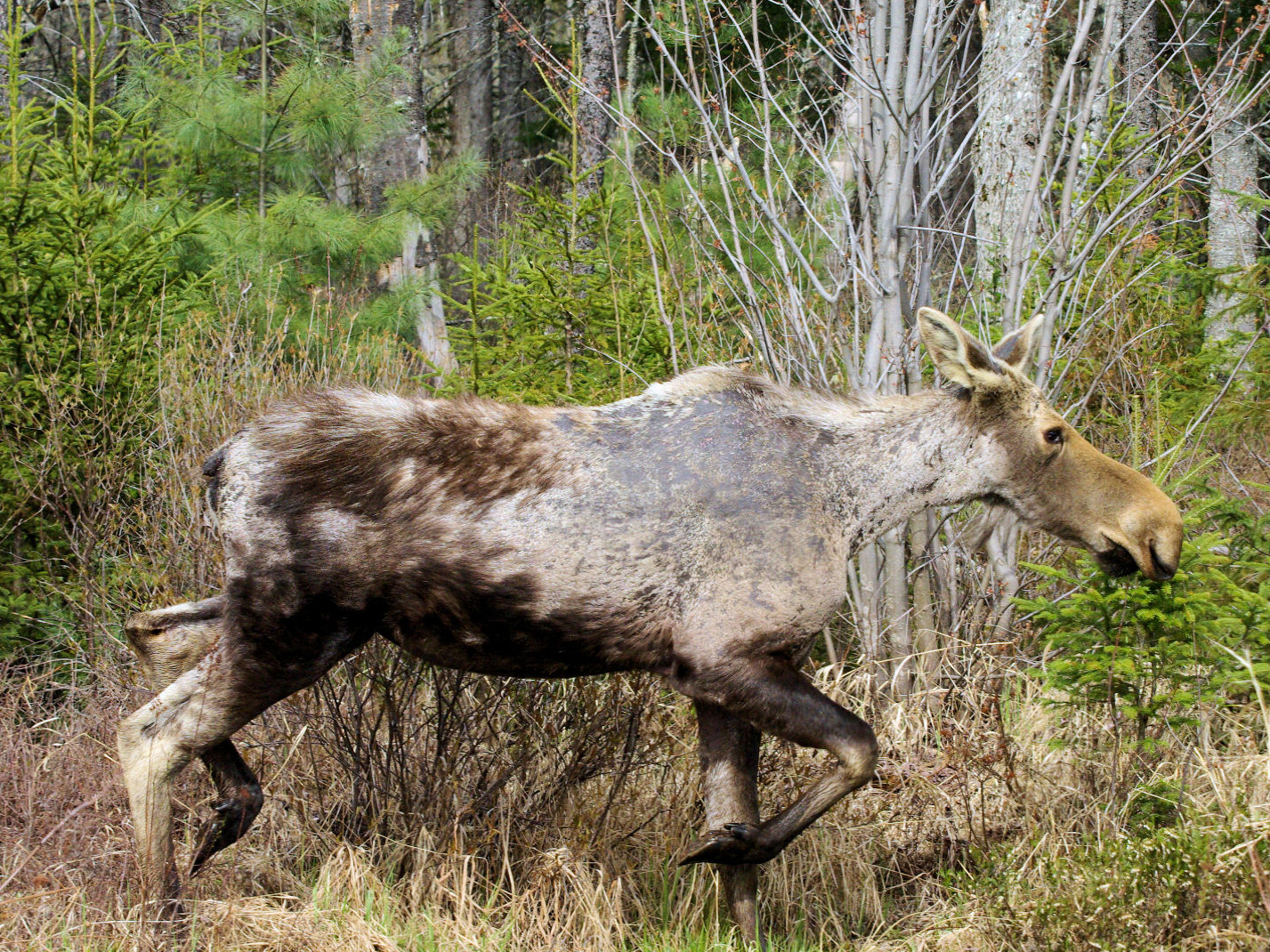
When moose rub against trees in an attempt to remove winter ticks, they can scrape off much of their dark brown hair, exposing pale undercoat and grey skin, like this female. These animals are nicknamed “ghost moose.” Photo by Daniel Bergeron for NHFG
You may have seen the headlines about the high mortality rates of Moose’s calves in sections of our region. A study published in the Canadian Journal of Zoology reported that 88 percent of moose calf deaths from 2014 to 2016 were related to ticks. We spoke with Kristine Rines in the spring of 2017. She’s a wildlife biologist with the New Hampshire Fish and Game Department. She described why moose are susceptible to tick infestations, and what ticks are doing to the animals.
You can listen to our full conversation with Kristine on “Episode 39: First in the Nation.”
Avoiding “Death on Katahdin”
Fall in New England means weather that can change, and fast. A day that seems perfect for a hike can quickly turn dangerous. Nobody pays more attention to this than Randi Minetor, she’s the author of Death on Katahdin: And Other Misadventures in Maine’s Baxter State Park. She is also the author of Death on Mount Washington. She warned us about the dangers of hiking in New England, and what we should all do when out hiking to stay safe.
The Role of Mushrooms in Moderating Climate Change
When you’re out in the woods this fall before the snow and ice take hold, you may have noticed there’s plenty of fungus among us. The rainy spring and the hot, humid summer has produced a bumper crop of the fruiting fungi we call mushrooms. But while lowly in stature, they play a critical yet little-understood role in regulating the global climate. Researchers in Boston are leading the effort to investigate the crucial, climate-fungi connection. WBUR’s Bruce Gellerman reports that the future of humanity may depend, in large measure, on the fate of fungi.
Photo at the top of the page: Georgina Sappier-Richardson sharing her story at a TRC community visit. Photo by Ben Pender-Cudlip, courtesy of the Upstander Project
About NEXT
NEXT is produced at Connecticut Public Radio
Host: John Dankosky
Producer: Lily Tyson
Digital Producer: Carlos Mejia
Executive Producer: Catie Talarski
Contributors to this episode: Martha Bebinger, Patty Wight, Patrick Skahill, NHPR’s The Exchange, Daniela Allee, Bruce Gellerman
Music: Todd Merrell, “New England” by Goodnight Blue Moon, “Redbone” by Childish Gambino, “New Slang” by The Shins
Stream every episode of NEXT.
We appreciate your feedback! Send critiques, suggestions, questions, and ideas to next@ctpublic.org. Follow us on Facebook and Twitter.
Help us spread the word! If you like what you hear, rate and review us on iTunes.

